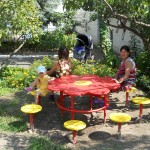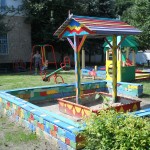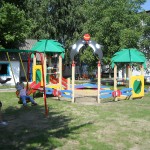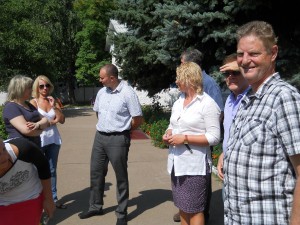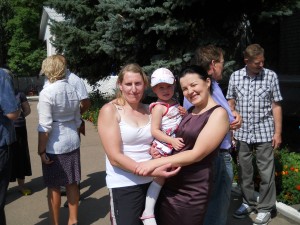28 July 2013. Chernihiv, northeastern Ukraine. Ezra Ministry’s Children’s Rescue Center includes an established ministry to girls and young women at a juvenile women’s prison near Kiev. Now the Children’s Rescue Center is exploring how it can help mothers with young children in another women’s prison in Chernihiv, not far from Toichna Nachnyom. We had the privilege of visiting this prison, where we were shown remarkable hospitality by the staff.
The purpose of our visit was to assess the needs of the women both while incarcerated and when released, and how ministry can be extended to them and especially their children. This was the first visit for Bruce. The relationship between the prison officials and Children’s Rescue Center, while developing positively, is still new and just being established. This was an exploratory mission for all of us.
We are a group of seven. Bruce, George, Sarah and I have just come that morning from five days at the children’s camp at the river. We are joined by Vera, Natasha and Lena, all from the Children’s Rescue Center in Kiev. Lena has been coming weekly for some time, and has the more relaxed composure of a veteran. The rest of us, at least the Americans, are taking shallow breaths not knowing quite what to expect.
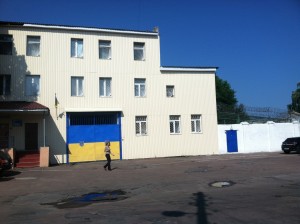 We gather at 10:00 am on a Sunday morning in the parking lot just outside the locked main entrance. We are on a bucolic tree-lined street where villagers stroll, some headed to or from a church where bells are tolling. The prison itself is an island of isolation in the middle of this pleasant, mid-sized town, an isolation emphasized with cement walls topped with razor wire. Across the street are nonchalant apartments and an auto repair facility that could be anywhere. There is no transitional element. The change in environment crossing the street from freedom to incarceration is cold and abrupt.
We gather at 10:00 am on a Sunday morning in the parking lot just outside the locked main entrance. We are on a bucolic tree-lined street where villagers stroll, some headed to or from a church where bells are tolling. The prison itself is an island of isolation in the middle of this pleasant, mid-sized town, an isolation emphasized with cement walls topped with razor wire. Across the street are nonchalant apartments and an auto repair facility that could be anywhere. There is no transitional element. The change in environment crossing the street from freedom to incarceration is cold and abrupt.
There is no lobby or visitors’ area. My understanding is we are there that day because visitors are allowed only on Sundays. I see no other visitors.
After a wait of some 15 minutes a woman in civilian business clothing from inside comes to collect our passports and disappears with them inside. She is officious but not rude. Clearance for each individual to enter has been arranged weeks in advance, but is still not guaranteed.
We are told we cannot bring any cell phones or money, which of course makes perfect sense, and we store these in our vehicles. But the surprise is we can bring cameras, to be used only when and where instructed. I retrieve mine.
More time passes. The woman staffer reappears, this time with a uniformed 6’ male guard. No one is smiling; it is all business. There is some paper work, curt Russian instructions, and we are ushered inside.
We pass through a series of small chambers, two at a time, as our credentials are cross-checked. Our image and voice identities are recorded electronically. Passage from the free world into the prison interior for our group takes almost an hour.
As anyone who has ever stepped into the confines of a prison, in any jurisdiction, can attest, the experience is beyond sobering. One progresses through steel doors, cages, and electronic equipment. Inside is functional and clean, but severely austere. The air is different, not an aroma, but an eerie quiet and a profound sense of isolation and distance. Public streets are just a few meters away, but so unreachable the distance feels like thousands of kilometers. The mechanical slam of a steel door says it all.
This prison has facilities for 12 mothers of children up to age three. At that age, the child is removed, and sent to a government orphanage, or sometimes placed with family. One can imagine the heartache and trauma this inflicts on the mother, and especially on the child to be separated from his or her mother at that age. We heard conflicting reports, but some reported that inmate mothers sometimes lose track of where their children are through the bureaucratic process. Children’s Rescue Mission is already working on trying to keep those connections. In any event the amount of contact between the inmate mothers and their children at that age abruptly becomes little or none.
We are escorted past oppressively dreary prison dormitories and wan, silent, unsmiling groups of inmates. The scene is occasionally punctuated with a mural, a small flower garden, or a cross. Our group is quiet. Between the language barrier and uncertainty as to what could or should be spoken out loud, there is not much to say.
It feels odd that we are there on a missions trip, brought in close proximity to those who presumably might have needs, and all we do is pass by them silently. Both the observed and the observers try politely not to stare. This is their home, however involuntary, and these are their lives. We have intruded, and brought not so much as a word of encouragement. One might offer at least a smile, but with the risk of being misinterpreted without more context, it seems better just to transit without being any more disruptive than we have already been. This is the time for silent prayers.
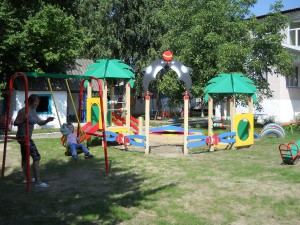 We are led to a walled enclave, a prison within the prison, for the inmates with young children. Our escorts open a sequence of heavy locked gates. These open up to what becomes the surprise of the day.
We are led to a walled enclave, a prison within the prison, for the inmates with young children. Our escorts open a sequence of heavy locked gates. These open up to what becomes the surprise of the day.
Inside is a spacious garden outfitted with play equipment and colorful murals. It is amazingly pleasant and park like. If it were not for the 6-meter high walls of the perimeter and the fact that no one is free to leave, it does not feel like a prison at all.
Inside the buildings, the habitable theme continues. Each mother/child pair has their own small bedroom and bath. In addition to the 12 rooms are group play areas and sitting areas. All are well finished, well equipped with books, toys and furniture, and overall very pleasant. The décor is wood floors, pastel paints, murals, and curtains. There are locked doors, to be sure, but no cells or bars. For these 12 mothers and their children, their facilities are remarkably better than what one would expect in any prison in any country.
The contrast stepping out of the general prison area into the area for mothers and children is nearly as much culture shock, but in reverse, from stepping into the prison in the first place. One has the sense that the barriers surrounding this inner enclave exist not to keep the occupants in but to keep the prison environment out.
It turns out that facilities are as nice as they are in part because a private prison ministry in Switzerland has contributed something like half of the funds for building and outfitting this mother/child unit of the prison. When the prison staff who were escorting us were asked what are the needs they face, they pointed to the need for several plumbing repairs. Ezra International through Bruce quickly agreed to fund these repairs. It may seem odd to some for private support to be going to a government facility like a prison. But the motivation in this instance was to build a relationship bridge to open the doors for further ministry. And it is worth remembering that the direct beneficiaries of this support are children and their mothers who already are facing enormous challenges.
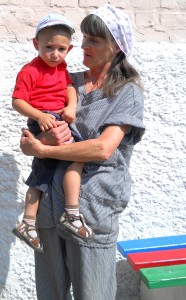 The scope of the needs for the women and their children here is difficult to appraise at this nascent stage of the relationship between Children’s Rescue Center and the prison officials. There is interest in assisting the inmate mothers with maintaining contact at some level with their children after they reach the age of three and leave the facility. There is also interest in assisting the women to transition to life outside the prison when their terms end with spiritual, social and vocational support and resources. Toichna Nachnyom is being considered as a possible half-way house for newly released women. For that to happen further facilities purchases and restorations will be required at Toichna Nachnyom.
The scope of the needs for the women and their children here is difficult to appraise at this nascent stage of the relationship between Children’s Rescue Center and the prison officials. There is interest in assisting the inmate mothers with maintaining contact at some level with their children after they reach the age of three and leave the facility. There is also interest in assisting the women to transition to life outside the prison when their terms end with spiritual, social and vocational support and resources. Toichna Nachnyom is being considered as a possible half-way house for newly released women. For that to happen further facilities purchases and restorations will be required at Toichna Nachnyom.
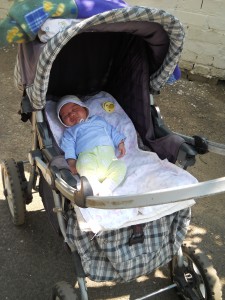 I am given permission here to use my camera, but I learn only now that the battery is dead after five days of lots of use without electricity camping by the river. Seeing our plight, the female staffer who has been escorting us makes a lengthy trip back to her office to retrieve a camera and becomes our photographer. All of the interior prison photos here are hers.
I am given permission here to use my camera, but I learn only now that the battery is dead after five days of lots of use without electricity camping by the river. Seeing our plight, the female staffer who has been escorting us makes a lengthy trip back to her office to retrieve a camera and becomes our photographer. All of the interior prison photos here are hers.
This is more than a courtesy. We are increasingly learning it is representative of how the staff sees us, as potential partners for a common mission. Without missing a beat of their obligation to maintain prison protocol and security, they have welcomed us as insiders. Literally.
After touring the garden courtyard and the dorm facilities, we have a chance to visit with the prison officials, to hear some of the inmates’ stories, and to speak and pray with some of them.
We get to know Alexander, an executive in the prison system in charge of a number of facilities in the region. Alexander has been leading our tour, and we now begin to hear more of his heart for the welfare of the women. This is an unexpected development, that a high-ranking official in a prison system in a former Soviet country would see his mission as the welfare of the inmates rather than merely being their warden. One could understand a prison official from any country becoming hardened and cynical, charged with keeping order for convicted criminals. None of that is seen in Alexander.
Without being solicitous, Alexander is most welcoming of our presence and interest in helping the inmates and their children, including spiritually. It is clear that he sees us as having a common objective.
Given Alexander’s receptiveness, we are encouraged to hear he is about to be promoted. Hopefully his attitude will be given a wider platform.
We tell Alexander that his care and concern for the women and their children is evidenced in the facility built for them. We express our gratitude for his and his staff’s hospitality.
What a pleasant surprise it is, to find one exercising his gift of hospitality inside, of all places, a prison.
We meet a couple of the inmate mothers. One is Melia, who shares some of her testimony, and her new walk with the Lord. She is being released in 4 months. But her daughter, Nastia, will be 3 in two months. Consistent with what we have learned about Alexander and his staff, the prison officials have granted a special exception to allow Nastia to remain past her third birthday to stay with her mother through the time of Melia’s release. We have the privilege of praying for Melia and laying hands on her. The prison officials participate in our circle.
We leave the prison, reversing the transition from inner mother/child enclave, through the general prison population area, and back on to the street. The distances, even the metaphorical ones, now do not seem as great, or the barriers as impenetrable. People are people, whether the captured or the captor, Ukrainian or Westerner. We all have a job to do. And the job we have to do is becoming increasingly clear.
It is now mid-afternoon, we are out of the prison, and in a city for the first time in five days. There is some talk of McDonald’s, but Vera leads us to a much better choice, a wonderful sidewalk restaurant on a main street in the center of the City. With flush toilets.
We’re tired from camping and the hours at the prison, and a little slovenly. We will be in Kiev by evening, the first leg of a three-day journey back to the states. More importantly, we now start to sort out what it all means, and where we go from here. That will take a bit longer, but we are already underway. We start with debriefing with Vera, Natasha and Lena, who are among those here carrying out this mission every day. And by ordering from an actual menu.
When King David was confined in a cave, he penned:
I cried to the Lord with my voice; with my voice unto the Lord I made my earnest plea.
I poured out my complaint before him; I laid before him my trouble.
When my spirit was overwhelmed within me, then You knew my path. In the way I would have walked, they have secretly laid a snare for me.
I looked on my right hand, but there was no one that would know me: refuge failed me; no one cared for my soul.
I cried unto You, O Lord: I said, You are my refuge and my portion in the land of the living.
Hear my cry; for I am brought very low: deliver me from my persecutors; for they are stronger than I.
Bring my soul out of prison, that I may praise Your name: the righteous shall encompass me all about; for You will deal bountifully with me. Psalm 142
Jesus said to visit those in prison is to visit Him. May we be those who would encourage and encompass those in prison, now, and after their release.

